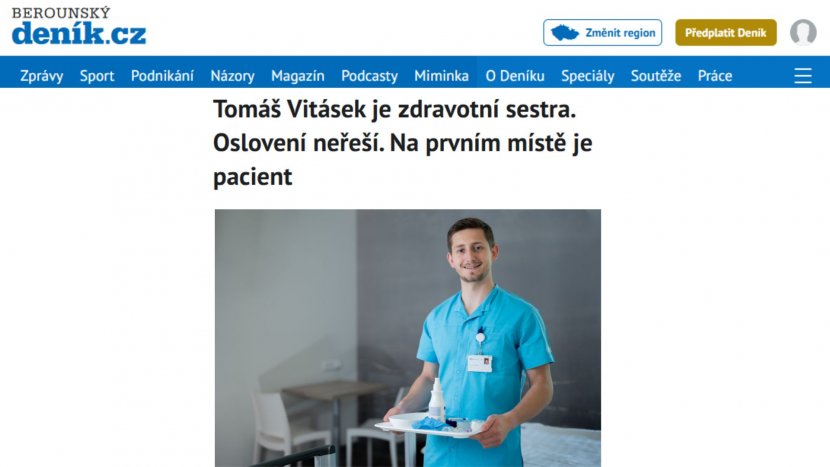Tomáš Vitásek is one of the few men in a profession that is often perceived by the public as typically female, namely nurse. He works at the Beroun Rehabilitation Hospital in the inpatient day care unit, where he takes care of patients. With professionalism, empathy and humour.
The Day Care Unit of the Arthroscopy Centre of the Rehabilitation Hospital Beroun is busy. Patients come for scheduled procedures, others are already recovering from surgery. Among the medical staff there is a young, energetic man , Tomáš Vitásek, a general nurse in intensive care, who is often called "nurse" or "Tomáš" by patients.
"It's a busy day, but we have a while before more patients arrive from the ward," Tomáš Vitásek said with a smile. Tomas successfully completed his master's degree last week and wants to continue his education in the field. He is one of the few men who chose the profession of nursing. He came to this field despite initial doubts and discouragement from his mother, who works as a nurse in the ICU.
The human approach
The inpatient ward has a specific daily routine, which is heavily dependent on the number of surgeries scheduled within the Arthroscopy Day Care Centre. The shift usually starts with the discharge of patients who have undergone surgery the previous day. However, not all are required to stay overnight, some are discharged the same day.
At the same time, new patients are admitted in the morning for elective procedures. "In the morning, we discharge, dress and educate patients who are going home. We prepare the surgeries, administer premedication and take patients to the operating room. After surgery, they come back to our ward, where we monitor vital signs, check wounds, put on braces, provide medication, and help with verticalization and first movements," described Vitasek.
Free time
Collaboration between nurses and orderlies is key in the day care unit. "We have experienced nurses and young colleagues. Without good cooperation, it wouldn't work. The team that sticks together is actually the basis of our work," Vitásek praised.
He breaks down stereotypes with a smile
According to him, communication with the patient is also key: "Patients are often nervous. It helps if we talk to them, explain to them what to expect. And sometimes a little humour helps. For example, if they don't know what to call me. I tell them I can hear everything. That usually makes them laugh."
The term "nurse" does not officially exist in Czech terminology. "So I'm a pure nurse (laughs). Either we agree that they just call me by my name, or nurse, and feel free to call me brother. I leave it up to them," he explained.
And it is humour that helps Tomas even in a predominantly female environment. "I feel comfortable here among my female colleagues. We make jokes, that's part of it. Sometimes female patients wish that a woman would rather prepare them for the operating room, I respect that. But so far I have not experienced during my work that being a man is a problem," said Vitásek.
A job that draws you in
There are still few men in nursing positions compared to women, but the situation is gradually changing. "It's a job that draws you in," said nurse Tomas. She also uses her knowledge outside the hospital. She goes to medical events or helps out as a lifeguard in her spare time.
He has a message for future and current colleagues: "Healthcare is not easy, but it makes sense. When you have a good team around you, it works. The beginnings are hard, but then come the practice and the first shifts, and you find the work is crazy interesting."
"Tomas is very popular in our team not only because of his empathy but also his professional approach. I wish there were more Tomášs like that. The male element in such a ward is in demand and we are glad to have him," concluded head nurse Iva Germeková.
Source: web Berounský deník, Jana Hájičková, 14 July 2025
